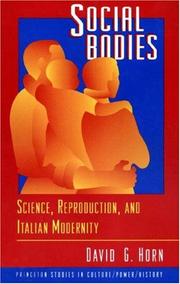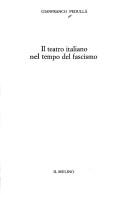| Listing 1 - 10 of 14 | << page >> |
Sort by
|
Book
Year: 1993 Publisher: Cambridge, Mass. Harvard University Press
Abstract | Keywords | Export | Availability | Bookmark
 Loading...
Loading...Choose an application
- Reference Manager
- EndNote
- RefWorks (Direct export to RefWorks)
Book
ISBN: 887573268X 9788875732684 Year: 1996 Volume: 16 Publisher: Roma Bonacci
Abstract | Keywords | Export | Availability | Bookmark
 Loading...
Loading...Choose an application
- Reference Manager
- EndNote
- RefWorks (Direct export to RefWorks)

ISBN: 0691037213 0691037205 9780691037219 9780691037202 Year: 1994 Publisher: Princeton, N. J. Princeton University Press
Abstract | Keywords | Export | Availability | Bookmark
 Loading...
Loading...Choose an application
- Reference Manager
- EndNote
- RefWorks (Direct export to RefWorks)
Human body --- Fertility, Human --- Fascism and culture --- Fascism and women --- Human reproductive technology --- Social aspects --- Symbolic aspects --- Government policy --- History --- Italy --- Politics and government --- Fertility [Human ] --- 20th century --- 1914-1945 --- Body, Human - Social aspects - Italy. --- Body, Human - Italy - Symbolic aspects. --- Fertility, Human - Government policy - Italy. --- Fascism and culture - Italy. --- Fascism and women - Italy. --- Human reproductive technology - Italy - History - 20th century. --- Italy - Politics and government - 1914-1945. --- Human body - Social aspects - Italy --- Human body - Symbolic aspects - Italy --- Fertility, Human - Government policy - Italy --- Fascism and culture - Italy --- Fascism and women - Italy --- Human reproductive technology - Italy - History - 20th century --- Italy - Politics and government - 1914-1945
Book
ISBN: 8860872529 9788860872524 Year: 2010 Volume: 44 Publisher: Firenze : Le lettere,
Abstract | Keywords | Export | Availability | Bookmark
 Loading...
Loading...Choose an application
- Reference Manager
- EndNote
- RefWorks (Direct export to RefWorks)
fascisme --- History of civilization --- Mussolini, Benito --- anno 1930-1939 --- anno 1940-1949 --- anno 1920-1929 --- Italy --- Fascism and culture --- Culture --- Economic aspects --- History --- Intellectual life --- Fascism and culture - Italy --- Culture - Economic aspects - Italy - History - 20th century --- Italy - Intellectual life - 20th century

ISBN: 9781403980021 1403980020 1403966044 9781403966049 Year: 2005
Abstract | Keywords | Export | Availability | Bookmark
 Loading...
Loading...Choose an application
- Reference Manager
- EndNote
- RefWorks (Direct export to RefWorks)
City planning --- Architecture --- Fascism and culture --- Urbanisme --- Fascisme et culture --- History --- Histoire --- Mussolini, Benito, --- Rome (Italy) --- Rome (Italie) --- Buildings, structures, etc. --- Constructions --- Mussolini, Benito Amilcare Andrea, --- Ville --- --Rénovation urbaine --- --Rome --- --Fascisme --- --Architecture --- --1900-1945, --- Italy --- Rome --- 20th century --- 1870-1945 --- City planning - Italy - Rome - History - 20th century --- Fascism and culture - Italy - Rome --- Rénovation urbaine --- Fascisme --- Mussolini, Benito, - 1883-1945 --- Mussolini, Benito Amilcare Andrea, 1883-1945 --- Rome (Italy) - History - 1870-1945

ISBN: 0520242165 1282357905 9786612357909 0520938054 1597346144 9780520938052 058538973X 9780585389738 9780520223639 0520223632 9781282357907 9781597346146 6612357908 Year: 2001 Volume: 42 Publisher: Berkeley : University of California Press,
Abstract | Keywords | Export | Availability | Bookmark
 Loading...
Loading...Choose an application
- Reference Manager
- EndNote
- RefWorks (Direct export to RefWorks)
Ruth Ben-Ghiat's innovative cultural history of Mussolini's dictatorship is a provocative discussion of the meanings of modernity in interwar Italy. Eloquent, pathbreaking, and deft in its use of a broad range of materials, this work argues that fascism appealed to many Italian intellectuals as a new model of modernity that would resolve the contemporary European crisis as well as long-standing problems of the national past. Ben-Ghiat shows that-at a time of fears over the erosion of national and social identities-Mussolini presented fascism as a movement that would allow economic development without harm to social boundaries and national traditions. She demonstrates that although the regime largely failed in its attempts to remake Italians as paragons of a distinctly fascist model of mass society, twenty years of fascism did alter the landscape of Italian cultural life. Among younger intellectuals in particular, the dictatorship left a legacy of practices and attitudes that often continued under different political rubrics after 1945.
Fascism and culture. --- Fascism and culture-- Italy-- History. --- Italy. --- Italy - Politics and government - 1922-1945. --- Fascism and culture --- Fascism --- Regions & Countries - Europe --- Italy --- History & Archaeology --- History --- Politics and government --- Intellectual life --- History. --- Culture and fascism --- Culture --- Fascisme et culture --- Fascisme --- Italie --- Politique et gouvernement --- Vie intellectuelle --- 20th century. --- cultural history. --- dictatorship. --- economic development. --- europe. --- european history. --- fascism. --- fascists. --- historical. --- history of culture. --- history of society. --- history students. --- human condition. --- interwar history. --- italian cinema. --- italian culture. --- italy. --- legacy of fascism. --- model of modern world. --- modern historians. --- modern history. --- modernity. --- mussolini. --- national identity. --- national traditions. --- revolution. --- social boundaries. --- social movements. --- social status.
Book
ISBN: 9782728309016 2728309019 Year: 2010 Volume: 440 Publisher: Rome Ecole française de Rome
Abstract | Keywords | Export | Availability | Bookmark
 Loading...
Loading...Choose an application
- Reference Manager
- EndNote
- RefWorks (Direct export to RefWorks)
Jean Bérard (1908-1957), fils de l’helléniste Victor Bérard et ancien membre de l’Ecole française de Rome (1933-1936 et 1939-1940), a refondé l’étude de la colonisation grecque en Italie méridionale et en Sicile, sujet de sa thèse de doctorat d’Etat (1941). Il a été le premier à présenter de manière rationnelle et critique l’étude des sources littéraires antiques sur ce phénomène majeur de l’histoire de la Méditerranée. Il a su aussi - dans la seconde édition de son livre en 1957 (année de sa mort accidentelle et prématurée) - saisir les perspectives nouvelles ouvertes par la recherche archéologique. De nombreux chercheurs, surtout italiens et français, engagés dans la recherche sur ce thème relisent ici une œuvre scientifique qui a été fondatrice d’un courant historiographique. Sa vie et ses engagements personnels sont également retracés ici, pour la première fois, grâce aux archives mises à disposition par la famille. Apparaît ainsi en pleine lumière le parcours singulier et attachant d’un jeune français cultivé découvrant l’Italie soumise au fascisme, se liant à des intellectuels italiens antifascistes de premier plan comme Umberto Zanotti Bianco, et donnant un regard à la fois spontané et médité mais aussi prophétique sur l’histoire contemporaine de l’Italie dans une Histoire du fascisme italien (1938) publiée sous un pseudonyme et mise au pilon dans la France occupée, à la demande de Mussolini. Il y a donc une double légitimité à voir le nom de Jean Bérard porté depuis 1966 par un Centre de recherche du CNRS et de l’École française de Rome : le Centre Jean-Bérard de Naples.
Archaeology --- Fascism and culture --- Archéologie --- Fascisme et culture --- History --- Histoire --- Bérard, Jean, --- Greece --- Grèce --- Colonies --- Archéologie --- Bérard, Jean, --- Grèce --- Culture and fascism --- Culture --- Archeology --- Anthropology --- Auxiliary sciences of history --- Antiquities --- Griechenland --- Hellas --- Yaṿan --- Vasileion tēs Hellados --- Hellēnikē Dēmokratia --- République hellénique --- Royaume de Grèce --- Kingdom of Greece --- Hellenic Republic --- Ancient Greece --- Ελλάδα --- Ellada --- Ελλάς --- Ellas --- Ελληνική Δημοκρατία --- Ellēnikē Dēmokratia --- Elliniki Dimokratia --- Grecia --- Grčija --- Hellada --- اليونان --- يونان --- al-Yūnān --- Yūnān --- 希腊 --- Xila --- Греция --- Gret︠s︡ii︠a︡ --- History. --- Archaeology - Italy - History - 20th century --- Fascism and culture - Italy - History - 20th century --- Greece - Colonies - History

ISBN: 8815045309 9788815045300 Year: 1994 Volume: 412 Publisher: Bologna Mulino
Abstract | Keywords | Export | Availability | Bookmark
 Loading...
Loading...Choose an application
- Reference Manager
- EndNote
- RefWorks (Direct export to RefWorks)
850 "19" --- Fascism --- -Fascism and literature --- -Italian drama --- -Italian literature --- Literature and fascism --- Literature --- Neo-fascism --- Authoritarianism --- Collectivism --- Corporate state --- National socialism --- Synarchism --- Totalitarianism --- Italiaanse literatuur--20e eeuw. Periode 1900-1999 --- History and criticism --- Theater --- Fascism and culture --- Italian drama --- Fascism and literature --- History --- -Italiaanse literatuur--20e eeuw. Periode 1900-1999 --- 850 "19" Italiaanse literatuur--20e eeuw. Periode 1900-1999 --- -Literature and fascism --- Theater - Italy - History - 20th century --- Fascism and culture - Italy - History - 20th century --- Italian drama - 20th century - History and criticism --- Fascism and literature - Italy --- Fascism - Italy

ISBN: 1282752049 9786612752049 1400821452 1400812119 9781400812110 9781400821457 0691037213 0691037205 9780691037219 9780691037202 Year: 1994 Publisher: Princeton, N.J. Princeton University Press
Abstract | Keywords | Export | Availability | Bookmark
 Loading...
Loading...Choose an application
- Reference Manager
- EndNote
- RefWorks (Direct export to RefWorks)
Using as his example post-World War I Italy and the government's interest in the size, growth rate, and "vitality" of its national population, David Horn suggests a genealogy for our present understanding of procreation as a site for technological intervention and political contestation. Social Bodies looks at how population and reproductive bodies came to be the objects of new sciences, technologies, and government policies during this period. It examines the linked scientific constructions of Italian society as a body threatened by the "disease" of infertility, and of women and men as social bodies--located neither in nature nor in the private sphere, but in that modern domain of knowledge and intervention carved out by statistics, sociology, social hygiene, and social work. Situated at the intersection of anthropology, cultural studies, and feminist studies of science, the book explores the interrelated factors that produced the practices of reason we call social science and social planning. David Horn draws on many sources to analyze the discourses and practices of "social experts," the resistance these encountered, and the often unintended effects of the new objectification of bodies and populations. He shows how science, while affirming that maternity was part of woman's "nature," also worked to remove reproduction from the domain of the natural, making it an object of technological intervention. This reconstitution of bodies through the sciences and technologies of the social, Horn argues, continues to have material consequences for women and men throughout the West.
Fascism and culture -- Italy. --- Fascism and women -- Italy. --- Fertility, Human -- Government policy -- Italy. --- Human body -- Social aspects -- Italy. --- Human body -- Symbolic aspects -- Italy. --- Human reproductive technology --Italy -- History -- 20th century. --- Italy -- Politics and government -- 1914-1945. --- Fascism and culture --- Fascism and women --- Fertility, Human --- Human body --- Human reproductive technology --- Italy --- Body, Human --- Human beings --- Body image --- Human anatomy --- Human physiology --- Mind and body --- Human fertility --- Natality --- Demography --- Human reproduction --- Infertility --- Women and fascism --- Women --- Government policy --- Social aspects --- Symbolic aspects --- History --- 20th century. --- Politics and government --- 1914-1945.
Book
ISBN: 8815024913 9788815024916 Year: 1990 Volume: 370 Publisher: Bologna Mulino
Abstract | Keywords | Export | Availability | Bookmark
 Loading...
Loading...Choose an application
- Reference Manager
- EndNote
- RefWorks (Direct export to RefWorks)
Publishers and publishing --- Fascism and culture --- History --- Giulio Einaudi editore --- Turin (Italy) --- Intellectual life --- 655.41 <45> EINAUDI --- 82:32 --- -Fascism and culture --- -Culture and fascism --- Culture --- Book publishing --- Books --- Book industries and trade --- Booksellers and bookselling --- Uitgeverij--algemeen--Italië--EINAUDI --- Literatuur en politiek --- -History --- -Publishing --- Einaudi editore --- Einaudi (Giulio) editore --- Casa Einaudi --- Casa editrice Einaudi --- -Intellectual life --- Giulio Einaudi editore. --- Intellectual life. --- -Uitgeverij--algemeen--Italië--EINAUDI --- -Giulio Einaudi editore --- 82:32 Literatuur en politiek --- -82:32 Literatuur en politiek --- Culture and fascism --- -Turim (Italy) --- Torino (Italy) --- Augusta Taurinorum (Italy) --- Comune di Torino (Italy) --- Città di Torino (Italy) --- Taurasia (Italy) --- Julia Augusta Taurinorum (Italy) --- Publishing --- Turim (Italy) --- Einaudi (Firm) --- Publishers and publishing - Italy - Turin - History - 20th century --- Fascism and culture - Italy - Turin - History - 20th century --- Turin (Italy) - Intellectual life
| Listing 1 - 10 of 14 | << page >> |
Sort by
|

 Search
Search Feedback
Feedback About
About Help
Help News
News